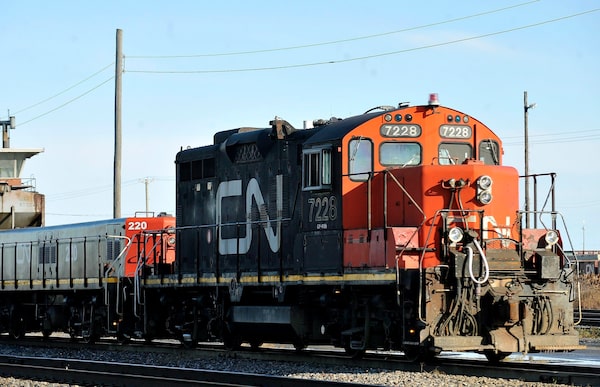
Canadian National Railway lined up a US$19-billion loan facility from J.P. Morgan and RBC Capital Markets for its US$30-billion bid for Kansas City Southern railway.Graham Hughes/The Canadian Press
Banks flush with pandemic deposits are providing huge credit facilities to companies involved in some of the biggest takeover bids so far this year, allowing buyers to include large cash components in their offers.
Most recently, Canadian National Railway lined up a US$19-billion loan facility from J.P. Morgan and RBC Capital Markets for its US$30-billion bid for Kansas City Southern railway – a 21-per-cent premium over a rival bid by Canadian Pacific Railway Ltd., which saw CP line up $9-billion in credit from BMO Capital Markets.
Canadian banks have performed strongly during the pandemic, bolstered by Canadians’ savings deposits. Eric Metivier, the head of Canadian corporate banking at CIBC Capital Markets, told The Globe and Mail that investment banks are well capitalized, which puts them in a good position to assist clients with acquisition targets.
“You’re seeing our clients resume their growth agendas, and those growth agendas have translated into some big transactions that are generally accretive to those clients and create meaningful synergies. And their bank partners are standing in to support them,” he said.
Bank of Canada hikes growth forecast, could raise rates in second half of next year
The large credit facilities allow companies to offer much more cash than stock in takeover bids. CN, for example, is offering US$200 in cash and 1.059 CN shares for each KCS share.
“I think in some cases you’ve seen more cash consideration because you’ve got very compelling synergies attached to the M&A transaction that allows a higher cash component,” Mr. Metivier said.
In a recent report, RBC Capital Markets banking analyst Darko Mihelic said Canada’s banks are carrying more than $20-billion of excess capital, beyond what regulators stipulate they hold. “We continue to believe that consumer lending (credit cards, auto loans, other personal loans) as well as commercial lending could rise significantly in a strong economic recovery,” he wrote.
Canadian mergers and acquisitions in the first quarter of 2021 saw record-high deal value, according to Mergermarket, an M&A data provider. One of the largest deals in the quarter was Rogers Communications Ltd.’s $20.4-billion all-cash bid for Shaw Communications Inc.
Rogers lined up a $19-billion bridge loan from BofA Securities, which BofA is syndicating to other banks. Sources told The Globe at the time of the announcement that Rogers will initially pay between 4-per-cent and 5-per-cent interest on the loan.
Low interest rates set by the Bank of Canada have driven down the overall cost of corporate loans, but other than a drop in the base rate, Mr. Metivier said banks’ loan terms have not changed.
“The rates being charged in connection with these loans are consistent with what these clients would be used to paying in general,” he said.
The use of massive borrowing to finance deals allows companies to avoid issuing large volumes of new shares and diluting their share price, but it has a potential downside.
Credit rating agencies have responded with concern over both bids for KCS. After CP announced its bid, its credit rating was downgraded by Moody’s from Baa1 to Baa2.
“The downgrade reflects the increase in adjusted leverage, which will exceed 3X through 2023,” Moody’s analyst Jamie Koutsoukis said in March. “It also incorporates the regulatory and integration risks of the acquisition.”
DBRS Morningstar, meanwhile, placed CN’s “A” rating under review after its bid was unveiled Tuesday. DBRS indicated the deal has many positives, but added that the offer is too levered for CN to maintain its current rating if it ultimately acquires KCS; the combined entity’s ratio of debt to earnings before interest, taxes, depreciation and amortization would be above a multiple of 4.5, a level “no longer commensurate with the current ratings.”
Mr. Metivier said high-leverage acquisitions can be positive if they ultimately drive growth.
“If you look at the large M&A transactions that have been announced recently, they’re all about growth, about synergy, about building in some cases national champions or global champions,” he said. “Those are all credit positive.
“Now that the level of uncertainty in the world has subsided somewhat, people are getting back to the growth agenda.”
Your time is valuable. Have the Top Business Headlines newsletter conveniently delivered to your inbox in the morning or evening. Sign up today.